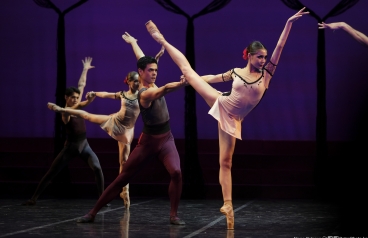BOLERO

"Bolero"
Maurice Ravel
Ballet in 1 Act
Script on the verses "Bodies in Bolero" by Otavio Coral
Symphony Orchestra and Ballet Company of the Kazakh National Opera and Ballet Theatre after Abay
Production Team:
Choreographer - Ricardo Amarante (Brasil)
Conductor - Yerbolat Akhmedyarov, Honored Figure of Kazakhstan
Scenographer and Costume Designer - Renê David Salazar (Brasil)
History
The famous dancer, soloist of the Russian ballet Ida Rubinstein decided to perform a choreographic composition on the theme of a Spanish scene on the stage of the Grand Opera in Paris. The dancer turned to Ravel with a request that he make an arrangement of some famous Spanish melody. Ravel, well acquainted with the original art of Spain, decided to write an original composition. In his autobiography, the composer wrote: “In 1928, at the request of Ida Rubinstein, I composed Bolero for orchestra. It is a dance in moderate movement, constantly the same both in melody and harmony, and in the rhythm that the drum continuously beats. The only element of change is brought here only by the orchestral build-up. According to the structure of Ravel's Bolero, it is a chain of variations based on a small melody of a folk-dance character, close to the Spanish bolero dance that developed in the 18th century, but with the rhythm of the Basque dance sortsico. The premiere took place on November 22, 1928 at the Paris Grand Opera. The choreographer was Bronislava Nijinska, artist A. Benois, conductor M. Ravel. The main role was played by Ida Rubinstein herself. Bolero was a great success. Throughout the 20th century, the ballet was staged repeatedly, both in the version of Nijinska, and the Russian and American choreographer Mikhail Fokine, the Russian and French choreographer Serge Lifar. At various times, the work was staged by choreographers Maurice Bejart, Alexei Ratmansky, Nina Yushkevich, Valentin Elizariyev and others. Two productions of "Bolero" to the music of M. Ravel are known in Kazakhstan: production by Zaurbek Raibayev in 1962 and Bulat Ayukhanov in 1968.




